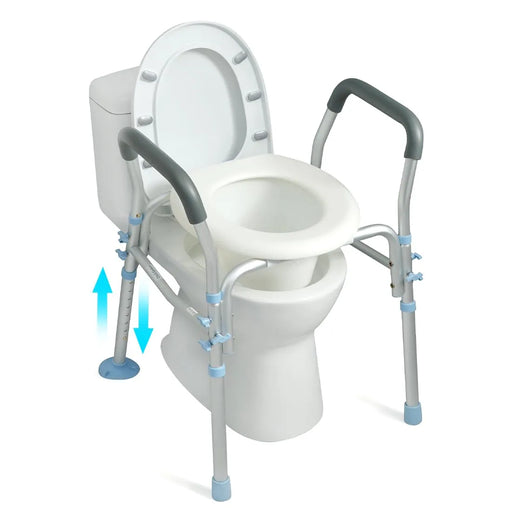Things You Need To Know About Spring Flu Prevention For The Elderly
The term "flu" is simply an abbreviation for influenza, the medical term for the condition. The respiratory infection known as influenza may have a very mild or very severe beginning, and its consequences range from hospitalization to mortality.
The influenza virus, responsible for the spring flu in older adults, may infect humans in addition to nearly every other animal and bird on Earth. Because of this, it can rapidly populate the whole planet.
Spring Influenza Viruses
The three most common spring influenza viruses are as follows:
Influenza A
All other flu epidemics and pandemics can be traced back to this one variant of influenza, making it the most prevalent form of the illness.
This variant of influenza is highly contagious and may infect people, animals (including pigs), and the avian species that spread it from continent to continent.
Influenza B
Influenza B, responsible for around 20% of annual flu infections, joins influenza A as the two leading causes of the illness. This variant is exclusive to humans (and seals) and is thus exclusively transmitted within our species.
Influenza C
Influenza C is the mildest of the three major types of influenza viruses and may infect both people and pigs. Influenza C does not create epidemics, hence there is no vaccination to protect against it.
When you get the flu, it starts in your throat and nasal passages and may go all the way down to your lungs if you're not careful.
Complications from the spring flu
A normal recovery from the spring flu takes around two weeks.
The elderly (defined here as anybody over the age of 65) have a greater risk than many other population subgroups of experiencing complications from the spring flu, and many of these symptoms may persist long after your immune system has eliminated the influenza virus within your body.
Other chronic problems that might arise from spring flu in the elderly include:
Pneumonia
It is possible to develop pneumonia after a bout with the flu, which is a respiratory ailment characterized by chest discomfort, coughing, trembling and sweating, and lower-than-normal body temperatures.
Pneumonia is the fourth largest cause of death in the elderly, but a pneumonia vaccination may protect them from contracting it if they have just recovered from the flu. Of all age groups, the elderly have the highest mortality rate from pneumonia.
Bronchitis
If you have a respiratory illness, like the flu, you may get bronchitis, which is an infection of the lungs. The primary sign is a hacking cough caused by inflammation and mucus in the lungs.
Certain types of bronchitis (chronic bronchitis) continue to flare up even after the flu has already left the system, whereas others (acute bronchitis) may move through the system in a span of two to three weeks.
Sinus and ear infections
Having the flu increases your risk of getting bacterial infections in your eardrum and nostrils. If you have the flu and have complications like persistent ear discomfort or sinus problems (beyond simply sneezing) that continue for more than three or four days, you should consult a doctor.
Dehydration
The elderly are more vulnerable to dehydration when they are ill. Dehydration may develop fast in the elderly since they contain 10–15 percent less water than younger generations, making it more crucial for them to drink enough fluids if they're ill.
Heart failure
According to the British Heart Foundation, cardiovascular problems including heart attacks are more common among those who have just recovered from the flu. Heart problems may develop when the body is weakened and more susceptible to attack by bacteria and other noxious chemicals.
How to prevent the spring flu
Get the flu vaccine
In spite of the fact that, according to NPR, only approximately 60% of flu shots are effective, it is still the greatest strategy to avoid catching the flu. The flu may be particularly hazardous for the elderly, who are more prone to have health difficulties as a consequence of the virus, according to the U.S. Centers for Disease Control and Prevention.
So, getting the seasonal flu vaccination every year is a great way to protect yourself. As the virus type evolves over time, the vaccination must evolve as well.
There are two age-appropriate immunizations available, according to the CDC. The "high dose vaccination" significantly boosts immunity because it delivers four times as much antigen as a standard flu injection.
Adjuvanted flu vaccines, such as Fluad, are also available with the goal of eliciting a stronger immune response. The MF59 adjuvant is used to produce this vaccination. There is always a chance of experiencing modest side effects after receiving a vaccination.
Wash your hands
While it may seem like a friendly reminder from your childhood, this is one of the most effective strategies to prevent harmful viruses during flu season.
It is also a good idea to regularly disinfect your hands with antiseptic soap and warm water, to shield your mouth when you are coughing or sneezing, and to limit your interaction with others who may be ill. You should also try not to have your hands near your face, especially your face, lips, and eyes.
Keep hydrated
Flu season is a particularly good reminder to drink plenty of water and keep yourself hydrated. Maintaining an adequate fluid intake, as recommended by Real Simple magazine, helps the immune system do its job and prevents a dry circulatory tract. When you consume enough water, you can combat the dryness of the winter air and emerge feeling revitalized and refreshed.
Get your rest
Restorative sleep is essential for bodily wellness. Make sure you get enough sleep every night and don't push yourself too hard to avoid catching a cold or the flu this season. Stop what you're doing and rest if you're feeling exhausted; otherwise, your exhaustion might lead to a more serious illness like the flu.
Eat foods rich in antioxidants
Nutritional experts also suggest eating more antioxidant-rich foods including nuts, vegetables, and whole-grain porridge. These meals not only contribute to overall health by providing more nutrients, but they also reduce swelling and boost the immune system in other ways.
Avoid crowds
Many people take trips this spring time of year to see family and friends for the holidays. Yet, the risk of contracting a cold or the flu from an infected individual is greatly amplified in crowded settings, such as aircraft. Try to stay away from crowded areas, particularly if they lack enough ventilation. Space constraints necessitate a minimum separation of six feet.
Ending
While doing the aforementioned measures might assist, being sick may still happen despite your best efforts. But there are still many ways to help you feel better and avoid complications. If you are sick with the flu, consult a doctor as soon as possible to shorten the duration of your illness and go back to normal life.
Recommend Products
-
 Sale
Sale
Standard - 300LBS Capacity Shower Stool
Original price $51.99From Original price $28.99Original price $51.99Current price $28.99From $28.99Current price $28.99OasisSpace Medical Square Shower Stool for Bathtub OasisSpace Square Shower Stool for Bathtub is approved as the highest standard(FDA) for medical...
View full detailsSaleOriginal price $51.99From Original price $28.99Original price $51.99Current price $28.99From $28.99Current price $28.99 -
 Sale
Sale
300LBS Capacity Raised Toilet Seat with Arms
Original price $120.99From Original price $69.99Original price $120.99Current price $69.99From $69.99Current price $69.99OasisSpace Raised Toilet Seat with Arms - Safe and Convenient OasisSpace Raised Toilet Seat with Arms provides stable support for users to sit dow...
View full detailsSaleOriginal price $120.99From Original price $69.99Original price $120.99Current price $69.99From $69.99Current price $69.99 -

350LBS Capacity 2 Wheel Walker
From Original price $39.99Original price$39.99From $39.99Current price $39.99Product Advantages OasisSpace's 350LBS Capacity walker offers a fusion of lightweight design and sturdy support, crafted from high-grade anodized ...
View full detailsFrom Original price $39.99Original price$39.99From $39.99Current price $39.99 -

Wall Mounted - 400LBS Capacity Teak Folding Shower Seat
From Original price $131.99Original price$131.99From $131.99Current price $131.99Advantages OasisSpace Teak Wall-Mounted Shower Seat adopts a folding design, which can save space to the greatest extent and can be folded up at a...
View full detailsFrom Original price $131.99Original price$131.99From $131.99Current price $131.99 -
 Sale
Sale
Padded & Bariatric - 500LBS Capacity Heavy Duty Shower Stool
Original price $57.99From Original price $36.99Original price $57.99Current price $36.99From $36.99Current price $36.99OasisSpace Medical Heavy Duty Bariatric Shower Stool OasisSpace Medical Heavy Duty Bariatric Shower Stool is approved by the FDA, which is the hig...
View full detailsSaleOriginal price $57.99From Original price $36.99Original price $57.99Current price $36.99From $36.99Current price $36.99 -
 Sale
Sale
300LBS Capacity Stand Alone Toilet Safety Rail
Original price $69.99From Original price $44.99Original price $69.99Current price $44.99From $44.99Current price $44.99OasisSpace Toilet Safety Rails - Fit Any Toilet OaisSpace stand-alone toilet safety rails provide sturdy support for the elderly and people with ...
View full detailsSaleOriginal price $69.99From Original price $44.99Original price $69.99Current price $44.99From $44.99Current price $44.99







